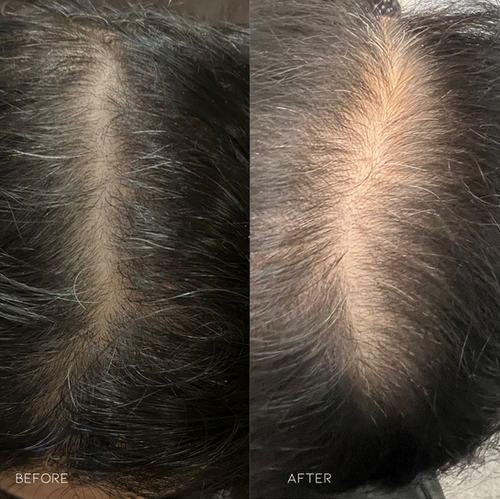There are several treatments for hair loss, depending on the underlying cause, severity, and your preferences. Here’s a breakdown of the most common and effective options:
Consultation and scalp scan
A consultation and scalp scan is a thorough evaluation of your scalp and hair health by a dermatologist, trichologist, or hair specialist. This process helps identify the causes of hair loss or scalp issues and is often the first step in developing a personalized treatment plan.
Hair peptide injections
How Peptide Injections Work
Exosome
Exosomes contribute to maintaining and preventing hair loss by promoting hair follicle growth, increasing cell proliferation, enhancing hair follicle health, reducing inflammation, oxidative stress, and promoting cell survival. They deliver growth factors, cytokines, and regulatory molecules that stimulate dermal papilla cells, improve nutrient delivery, and support overall hair health, ultimately leading to improved hair growth and reduced hair loss.
Exosome
Exosomes contribute to maintaining and preventing hair loss by promoting hair follicle growth, increasing cell proliferation, enhancing hair follicle health, reducing inflammation, oxidative stress, and promoting cell survival. They deliver growth factors, cytokines, and regulatory molecules that stimulate dermal papilla cells, improve nutrient delivery, and support overall hair health, ultimately leading to improved hair growth and reduced hair loss.
Platelet-Rich Plasma (PRP) Therapy
Scalp microneedling
Scalp microneedling
Nutritional Supplements
- Biotin: A vitamin commonly used to strengthen hair.
- Iron, Vitamin D, and Zinc: Deficiencies in these nutrients can contribute to hair loss, so supplementation can help if you have a deficiency
- Saw Palmetto: A natural supplement sometimes used to block DHT.
Hair Care and Scalp Treatments
- Using gentle shampoos, avoiding heat styling, and maintaining a healthy scalp environment can help slow down hair loss.
- Scalp massages may also improve blood circulation, promoting healthier hair growth.
Hair Care and Scalp Treatments
- Using gentle shampoos, avoiding heat styling, and maintaining a healthy scalp environment can help slow down hair loss.
- Scalp massages may also improve blood circulation, promoting healthier hair growth.
Lifestyle and Stress Management
Medications
- Minoxidil (Rogaine): A topical treatment applied directly to the scalp. It can slow hair loss and promote hair regrowth in both men and women. Available over-the-counter in liquid or foam.
- Finasteride (Propecia): A prescription oral medication for men that reduces the hormone DHT (dihydrotestosterone), which is linked to hair loss.
- Dutasteride (Avodart): Similar to finasteride but more potent in inhibiting DHT, used for more aggressive hair loss cases.
- Spironolactone: A medication that blocks androgens, often prescribed for women with hormonal hair loss.
DNA Testing
DNA Testing
Book Your Consultation Today
It’s important to have consultation booked to identify the cause of your hair loss and to determine the best treatment plan for your situation.


